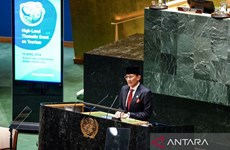World Bank: Thailand needs to revive inclusive growth
Thailand needs restart its economic engine in more green and inclusive ways that benefit all people in the country and help protect the environment, a latest World Bank report said on March 13.
 A supermarket in Thailand (Photo: wsj.com)
A supermarket in Thailand (Photo: wsj.com)Bangkok (VNA) - Thailand needs restart its economic engine in more green and inclusive ways that benefit all people in the country and help protect the environment, a latest World Bank report said on March 13.
The report - “Getting Back on Track: Reviving Growth and Securing Prosperity for All,” is the first systematic analysis on national economic issues for Thailand by the World Bank (WB). It assesses the most pressing challenges and opportunities in ending poverty and boosting shared prosperity in the country.
The WB’s report highlights four priorities: reining in rapid depletion of its natural resources; strengthening the institutional capability of public sectors to implement reform; creating more and better jobs and providing support to millions of the 40 percent poorest if it is to achieve green growth that brings prosperity to all.
"Thailand is a country of vast potential. We believe that when economic development benefits all groups in society, then that will by itself contribute to stability and social cohesion," Ulrich Zachau, the bank's Director for Southeast Asia, told journalists at the launch of its report.
A decade ago, Thailand ranked above other Southeast Asian and upper-middle-income countries on all dimensions measured in the World Economic Forum's Global Competitiveness Index. Today, other nations have caught up, the WB’s report said. The country of 66 million people is also experiencing a slowdown in job creation caused by a weak global economy and loss of its competitive edge.
According to the report, between 1986 and 2014, high growth reduced poverty in Thailand from 67 percent to 10.5 percent of its population. But the country has been troubled by unrest in the past decade. In 2014, an estimated 7.1 million Thai people were poor and an additional 6.7 million were at risk of falling into poverty. Inequality also remains a major challenge of Thailand, the report said.
Meanwhile, one-third of all 15-year-olds nationwide are illiterate, the report said. The number rises to 47 percent in villages, underlining the inequality between the capital city and the rest of Thailand.
The rate of depletion of Thailand's natural resources has sped up in the last decade, the report showed. It costs 4.4 percent of gross national income, similar to other countries in the Pacific region, but is almost double the rate in 2002 and triple the rate in the 1980s. Saline intrusion could also cause coastal farms to be less productive, the report said.
Climate change and environmental degradation, meanwhile, are making Thailand more vulnerable to natural disasters, the World Bank report warned. More frequent coastal flooding poses the biggest threat low-lying Thailand, the report said.
According to the Thailand Meteorological Department, the country's annual mean temperature rose by one degree Celsius from 1981 to 2007, and precipitation has suffered an overall decrease over the last 50 years, raising the risk of drought in many regions of the country.-VNA













